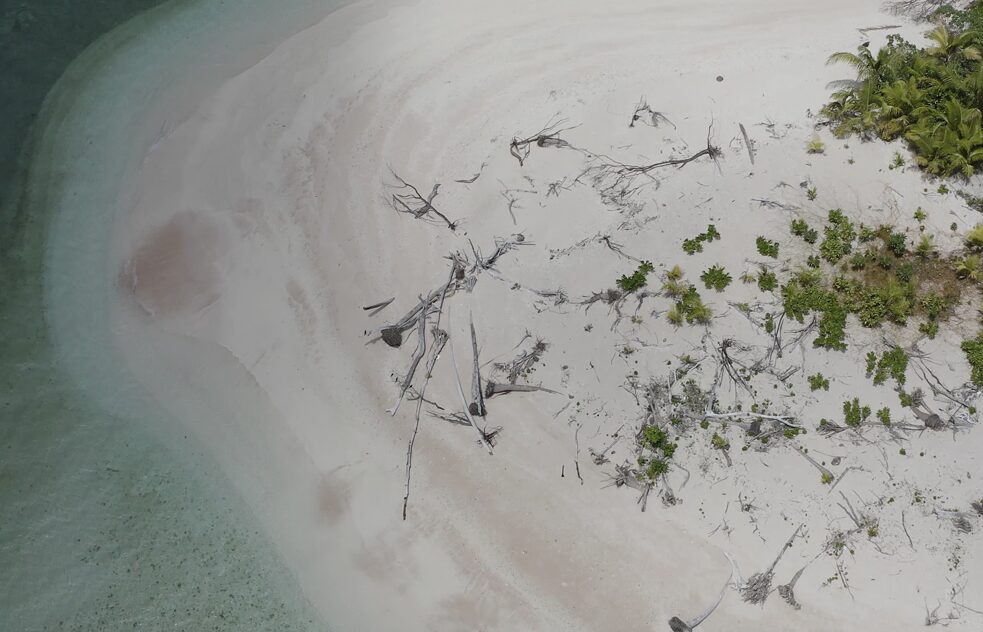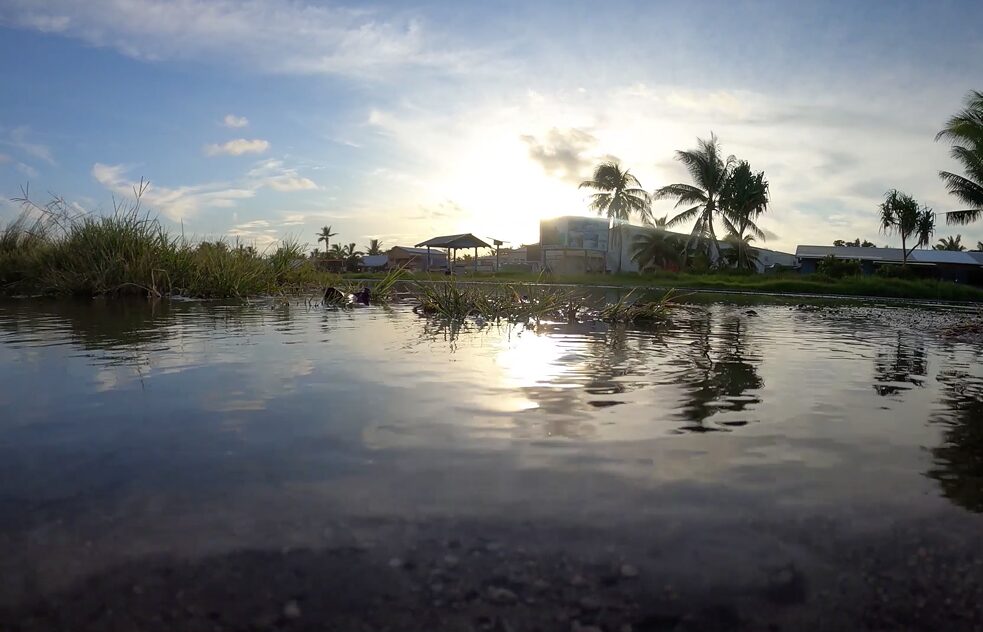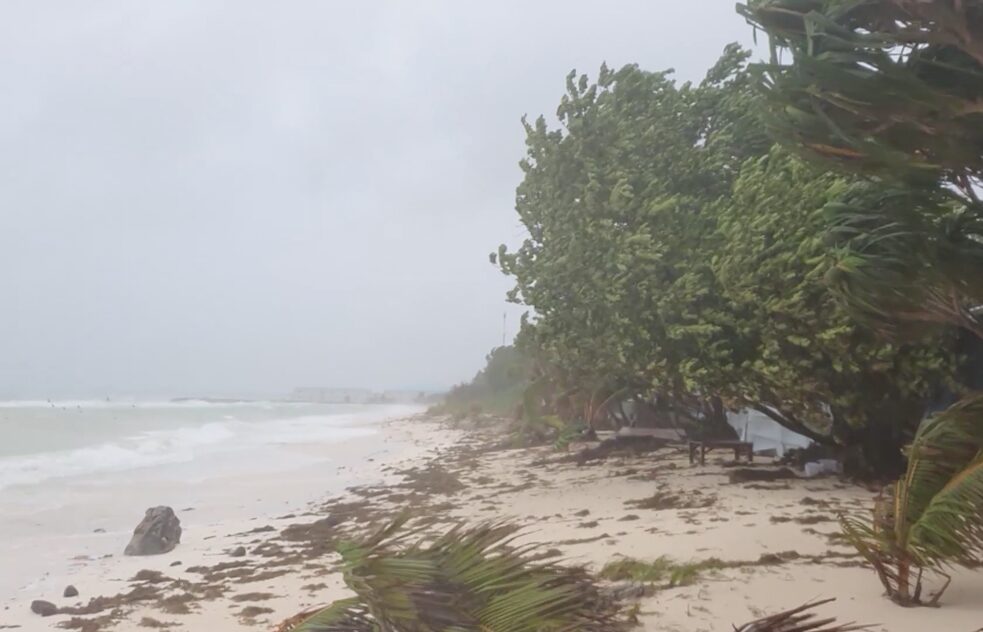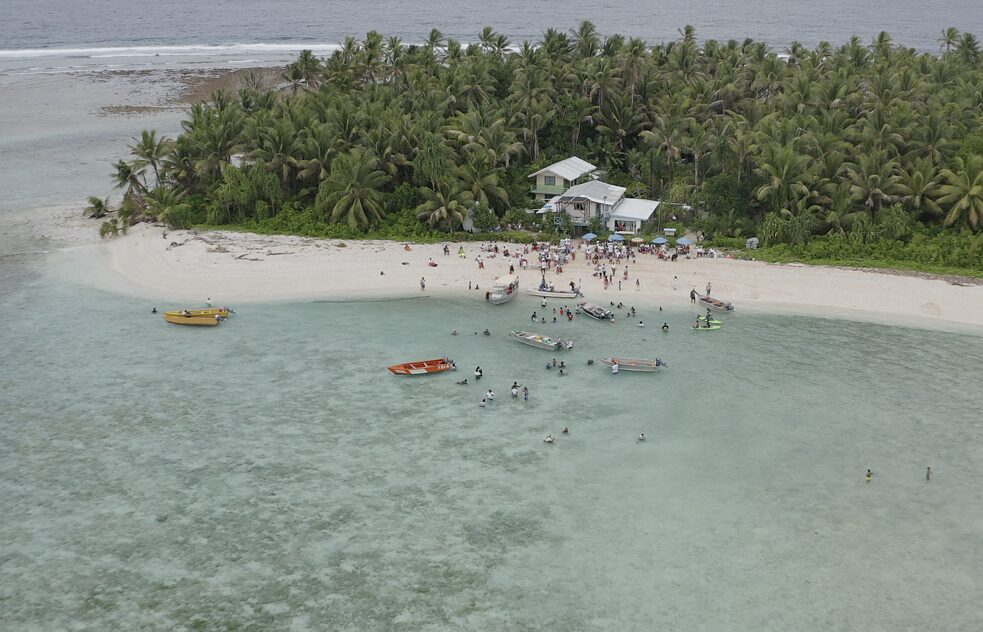Rising Sea Level
A Future in Tuvalu
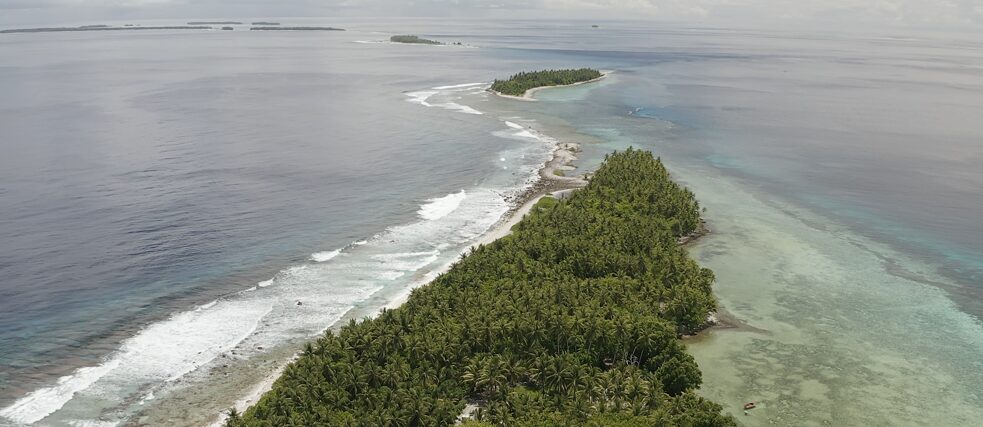
Rising sea levels pose a severe threat to islands such as Tuvalu. Already the island faces heavy floods, which could one day erase the island state from the map completely. This personal narrative highlights what freedom means under these circumstances and what might be lost if climate change isn’t combatted around the world.
By Bernard Kato Ewekia Taomia und Esther Meunier
When I look back, I remember a happy childhood. I was born and raised in Tuvalu, a small island state in the Pacific. Life used to be joyful and effortless but nowadays I have to worry and fight for the future of the very island I call home and that my ancestors have called home for generations. Unfortunately, the climate crisis and rising sea levels are threatening my land and my people’s future. I have no intentions of leaving, but if the current trends continue, I, as all Tuvaluans, may not have a choice.
Tuvalu is extremely low lying; notably, there are no mountains. Hence, the majority of our land is less than 2 metres above sea level. As a consequence, we are vulnerable to climate change and other environmental threats, including rising sea levels, frequent floods, erosion, and more frequent and intense cyclones. All of these put our territory at risk of submersion.
Soaked in Water
You might think that with the rising sea levels, the tideline is pushed further and further into the land. In reality though, the water is coming from underground. Although quite difficult to picture, you can visualise the earth soaking in water. As a consequence of this phenomenon, parts of our islands that used to be above sea level are continually sinking below, never to rise again. And when storms hit our land, the disaster gets worse. In 2015, Cyclone Pam erased two of our islands. They were erased from the map and vanished forever. In 2019, it was Cyclone Tino that had the worst effects: it unearthed many of our ancestors’ graves and their bones filled our lagoons. No words can describe the sorrow and devastation we felt at the time. The environmental crisis not only threatens our homes, but also our quality of life, our standards of living, our history, and our culture. During hurricanes, the strong wind viciously causes the roofs of our houses to collapse, while triggering power cuts and infecting our aquifers with sea water. It is painfully hard not to be able to see a future in Tuvalu.Living Through the Climate Crisis
Children growing up nowadays do not get the chance to live the innocent and carefree life I had the privilege to enjoy when I was younger. Living through the era of the climate crisis, most children are already aware of climate change and its causes and impacts, for they know it could force them to emigrate someday. Many Tuvaluans have already left and have become climate change refugees. They are leaving because they are insecure and afraid that in the future, they may not be able to sustain themselves and their families. They are leaving because Tuvalu is sinking.Within less than 100 years, our homeland may vanish forever, washed away. I’m afraid of this possible – and plausible – future. I have travelled and stayed abroad, for instance, in New Zealand. Yet it has never felt the same as in Tuvalu. On the contrary, living abroad feels foreign, strange and meaningless – it simply does not resonate with our history and customs. If we lose Tuvalu, the land won’t be the only loss. All the traditional knowledge and heritage that our ancestors lovingly passed on to us and we are now passionate to transfer to the newer generations, including our traditional clothes that are the most colourful in the Pacific, and our language that is part of our identity, all of it will be lost too.
Tuvalu is, has been and will continue to be my home for as long as it can be. We are on the frontline every single day, trying our best to sustain and preserve our identity.
When I have kids, I want them to learn about Tuvalu’s traditions, but if I have to take them to live abroad, if we have to flee, then they won’t have access to this very life changing opportunity. How can you talk about freedom, when it feels like my legs are tied together and I have to run? Would you dare to ask someone fleeing an existential threat if they are free? No, because you know they are not. They do not have a choice. Just like we won’t have one, if the international community does not wake up right away.
Reducing Global Emissions
I only wish world leaders would hear our voices. Would notice that we are drowning and that there won’t be any of us left if they do not take action. As Tuvaluans, we are not responsible for climate change. We barely even contribute to global emissions. And yet, we will suffer from the most direct consequences. We are a small nation, and though we are fighters and have found the strength to rise up after the many disasters we have already been through, we cannot win this battle alone. We need help to fight climate change and reduce global emissions. We need help to face the consequences, build sea walls, and develop infrastructure that will resist the many more cyclones and flooding we will endure. We can do it, we can save our country and yours, too. We can preserve our freedom and yours, but only if we do it together.Tuvalu is, has been and will continue to be my home for as long as it can be. We, as Tuvaluans, are fighters. We are on the frontline every single day, trying our best to sustain and preserve our identity. However, in this effort, we are urging everyone to join us. “Saving Tuvalu” is not only an organisation. It is the means of providing my children with a bright future on the lands that have witnessed their society prosper in a plethora of magnificent ways.
If Tuvalu sinks, the world sinks with it. But if Tuvalu prevails, the world prevails too.
